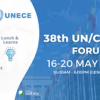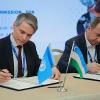News
Displaying Results 101 - 125 of 175
Namibia shares all its perennial rivers with neighboring countries and is both a mid-stream and downstream country. Transboundary water cooperation is therefore crucial for Namibia’s water security and sustainable socio-economic development. In today’s interconnected world, water availability is…
Transport continues to be a significant source of air pollution, especially in cities in the UNECE region. Air pollutants, such as particulate matter (PM) and nitrogen dioxide (NO2), harm human health and the environment. Although air pollution from transport has decreased in the last decade…
The temporary importation of private and commercial vehicles is managed through “carnet de passages en douane” (CPD) on the basis of two international conventions (the 1954 Customs Convention on the Temporary Importation of Private Road Vehicles; and the 1956 Customs Convention on the Temporary…
The Second High-Level International Conference on the International Decade for Action “Water for Sustainable Development”, 2018-2028, held on 6-9 June 2022 in Dushanbe, Tajikistan, was a strong call for acceleration of efforts on water-related goals and targets of the 2030 Agenda. The meeting…
Have you ever wondered what causes air pollution? Are you interested in learning about the effects of air pollution on your health and the environment? Do you want to learn how we can jointly work on cleaner air? If you replied yes to any of these questions, then you are encouraged to take the e-…
The third online meeting on the new Master Plan for Kharkiv on 28 May 2022 saw a group of local architects join the discussions led by the Norman Foster Foundation and the City Government of Kharkiv. Mayor of Kharkiv Ihor Terekhov spoke of his vision to transform the city to become a great…
Adapting to climate change and managing the risks of natural and technological hazards in transboundary basins has become critical, as the frequency and intensity of extreme weather events - such as floods, droughts, landslides or storms - are on the rise in the wake of the changing climate. Timely…
UNECE was engaged at the main global forum to assess and discuss progress in implementing the Sendai Framework for Disaster Risk Reduction (DRR) – the seventh session of the Global Platform for Disaster Risk Reduction (GP2022) held in Bali and online, 25-27 May 2022, fully embracing its theme: “…
Almost all of Zambia’s territory sits within transboundary rivers basins, the Zambezi and Congo River Basins each covering approximately 75% and 25%, respectively, of Zambia’s territorial area.
In this context, Zambia has confirmed its intention to accelerate the accession process to the…
Recent disruptions of supply chains have exposed fragilities in the current trading system and brought to light the importance of resilience and transparency in global trade.
UNECE and other international organizations play a crucial role in supporting countries (including both the public and…
The textile industry is a key driver of Uzbekistan’s economy, reflected in the country’s rank as sixth largest cotton producer in the world. In 2021, the country accelerated the battle against its child and forced labor violations in cotton harvest according to a new International Labour…
New multilateralism, focused on creating synergies between local, national, regional and global efforts, combined with practical, forward-looking solutions are needed to address the pressing challenges facing cities across the globe, including the coronavirus pandemic, rapid urbanization, and…
As supply chains within the garment and footwear sector are becoming increasingly complex, the need for transparency is more relevant than ever. Consumers, investors and shareholders are pressing for transparent business activities as well as the prevention and mitigation of risks in value chains,…
With the review of the amended Protocol to Abate Acidification, Eutrophication and Ground-Level Ozone (Gothenburg Protocol) under the UNECE Convention on Long-range Transboundary Air Pollution well underway, experts further discussed the sufficiency and effectiveness of current measures at the 60th…
“There is a not a single major global challenge that does not involve water. This includes migration, conflict, disease, hunger, gender equity, population growth, urbanization, and climate change”. These were the words of UN-Water Chair, Mr. Gilbert Houngbo, as governments and key stakeholders from…
Global trade has been transformed repeatedly throughout history, driven by new business processes and new policies. The new advances in digitalization now promise further transformation by making it faster, more transparent, reducing risks of red tape and corruption. With the increase in global…
Over 60 participants worldwide joined the online roundtable organized by the UN Digital transformation group for Europe and Central Asia (DTG4ECA) in the framework of the Regional Forum on Sustainable Development for the UNECE region. Established in May 2020, DTG4ECA group, co-chaired by UNECE and…
The residential sector is one of the major consumers of energy in many countries. In Armenia, for example, it accounts for 33% of total energy use. Rising fuel prices will bring substantial affordability challenges for low-income customers to heat their homes. According to UNECE research, at least…
Cities have the power to accelerate the achievement of the 2030 Agenda Sustainable Development Goals (SDGs) through their work at the local level. Examples of this will be presented and discussed at the H22 +50 Session (31 May 2022), and Dialogue of Eminent Experts on smart, sustainable, and…
Strengthening value chains between Africa and the European Union (EU) is a priority objective for sustainable growth and decent jobs across the two continents. Recent market imbalances and disparities, involving supply chain disruptions and lack of attention to the social and environmental impacts…
Today marks the holding of the first meeting of the Working Group on Tailings Safety and the Prevention of Accidental Water Pollution (IIWG) in Kazakhstan – the first comprehensive dialogue on these issues between all relevant stakeholders and national authorities in the country.
After being…
The global economy enters 2022 with new challenges. Almost two years into the Covid-19 pandemic the digitalization of transport and trade data flows is on top of the economic agenda. In response, UNECE organized its 4th workshop on trade facilitation, Single Window, and data sharing for the Western…
Improving energy efficiency is one of the most cost-effective options for climate action and to meet growing energy demand in most countries. It contributes to energy security, a better environment, improved quality of life, and economic well-being. Out of all sectors of economic activity, the…
Trade facilitation is a key priority for Kyrgyzstan and its trading community for participation in the global and regional trading system. Under the project on “Strengthening the capacity of the Kyrgyzstan National Trade Facilitation Council to implement the WTO Trade Facilitation Agreement”, UNECE…
Complex global value chains include production facilities scattered all over the world. Sometimes, they may also involve practices of illegitimate subcontracting and undeclared informal work. In fact, their complexity and opacity make it very hard to gain accurate information about how and where…


























